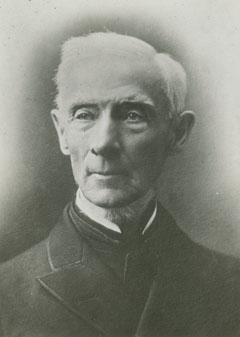Did You Know?: Purdue's first president
August 28, 2014
 |
|
Richard Owen, a scientist, academic, professor, doctor and Civil War veteran, served as Purdue's first president from 1872-74. (Photo courtesy of Purdue University Archives and Special Collections) |
Purdue's first president was Richard Owen, a Civil War veteran who was integral to the University's creation despite the fact that he served for less than two years.
Owen's life story is fascinating and complex, and his connection to Purdue is a remarkable chapter in the University's history, according to historians.
Born in 1810 in Lanarkshire, Scotland, Owen moved with his family to New Harmony, Indiana, when he was 17. Owen's father, the industrialist and social reformer Robert Owen, was an architect of a short-lived experiment to create a utopian community in the town. Although the social experiment failed economically just two years after it began, the Owen family stayed in Indiana.
Owen received his formal education in Scotland and Switzerland. He was an accomplished scientist, academic and professor, according to "The New Purdue," a manuscript written in 1946 by the late George Munro, a Purdue professor of thermodynamics.
In his 40s, Owen served as professor of natural science at the Western Military Institute of Kentucky. When the institute relocated to Tennessee a few years later and merged with Nashville University, Owen moved with it. Shortly thereafter, he obtained a medical degree from the Medical College of Nashville.
He resigned from his faculty post in 1858, returned to Indiana and became assistant state geologist, according to "Richard Owen: Scotland 1810, Indiana 1890," written by Victor Lincoln Albjerg. When the state geologist -- Owen's brother, David Dale Owen -- died in 1860, Owen succeeded him.
In 1861, when the Civil War began, Owen joined the Union Army as a lieutenant colonel. He was quickly promoted to colonel following his involvement in several battles. In 1862, Owen was placed in command of 4,000 Confederate prisoners of war at Camp Morton in Indianapolis.
Owen earned a reputation for kindness and judiciousness as the camp's commander, according to Albjerg. He wrote regulations that effectively allowed the Confederates to govern themselves. Owen also provided the prisoners with books, created a prisoner-staffed bakery and allowed them to form glee clubs, theatrical groups and sports teams.
After Owen and his regiment were transferred to a battle position later that year, they were captured in Kentucky. Upon learning that Owen was among the prisoners, Confederate Gen. Simon Bolivar Buckner personally thanked him for his kind treatment of the Camp Morton prisoners. Owen and his regiment were quickly paroled and released; Owen led his soldiers through several other battles until late 1863.
Owen resigned from the Army that year. He moved to Bloomington, where he became a professor of natural sciences at Indiana University. There, Owen often advised President Cyrus Nutt on faculty appointments.
After the U.S. Congress passed the Morrill Land-Grant Colleges Act in 1862, Owen worked with Nutt on a proposal for an agricultural college that would be affiliated with Indiana University. Instead, the state used those funds in 1869 to create a new school near Lafayette -- Purdue.
Purdue's trustees hired Owen as the University's first president in August 1872. Shortly afterward, Owen sold Purdue a collection of sciences books that served as the basis of the University's first library.
During his tenure, Owen devised several proposals for the trustees' consideration, including one that called for student rule-violators to be tried by a jury of fellow students. Owen also advocated for the creation of more comfortable dormitories and for an academic emphasis on agriculture over other fields of study.
The trustees disagreed with several of Owen's ideas, and as a result, Owen resigned the Purdue presidency in March 1874. Owen never drew a salary during his tenure at Purdue, which did not offer its first classes until later in 1874. Abraham C. Shortridge, an Indianapolis educator, succeeded Owen as Purdue's president.
After his resignation, Owen returned to work full time at Indiana University and became its museum curator. He retired in 1879 and died in March 1890. He is buried in New Harmony.
The Richard Owen papers, which document his life and his administrative recommendations to Purdue's trustees, are housed in the Virginia Kelly Karnes Archives and Special Collections Research Center. In 1957, Purdue opened the first president's namesake building, Owen Residence Hall.
Writer: Amanda Hamon Kunz, 49-61325, ahamon@purdue.edu

